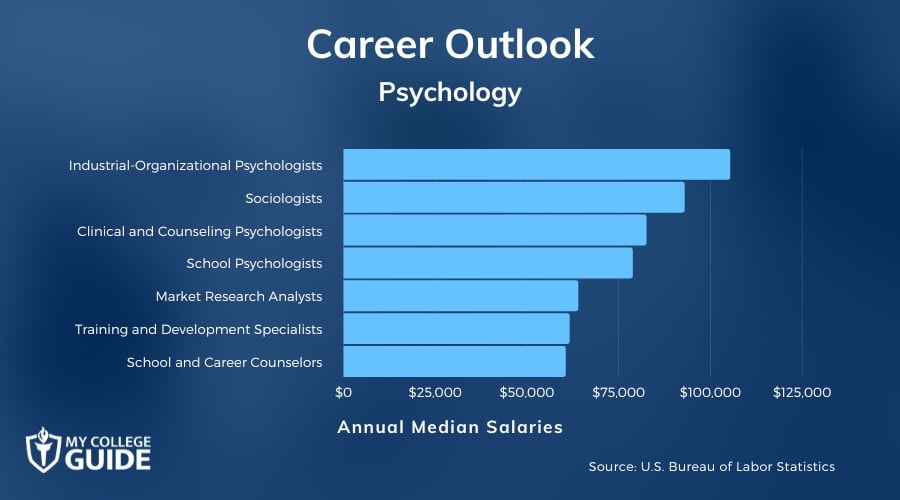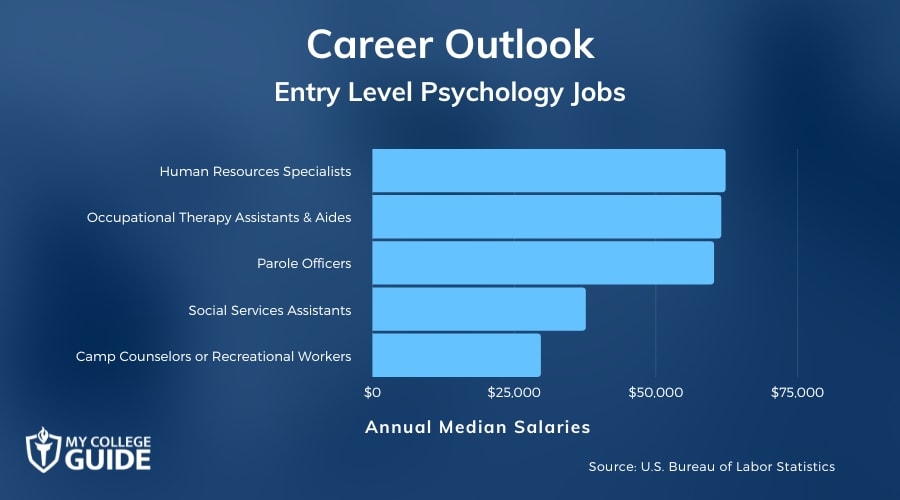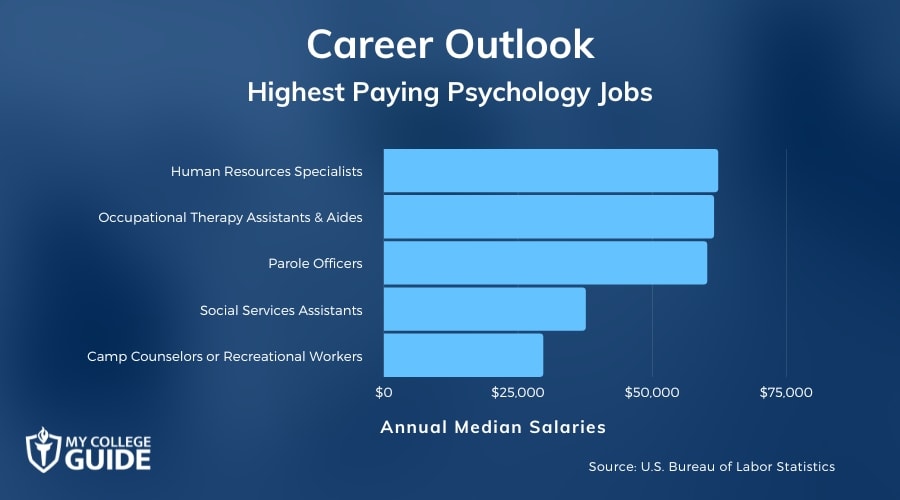Is a psychology degree worth it? Psychology degrees can be beneficial in gaining a deeper understanding of the human mind and behaviors.

Individuals can gain knowledge on how to assess the emotions and thought processes of others and apply it to their career field.
Editorial Listing ShortCode:
Majoring in psychology is not only useful for individuals who wish to become a psychologist, but it can also give professionals useful skills for several different industries and careers.
Is a Degree in Psychology Worth It?

Yes, a degree in psychology is worth it for many students. If you’re interested in the complex details of how humans think and behave, a psychology degree might be a good degree choice.
Psychology degrees are often associated with psychology careers. While many students pursue a psychology degree, for this reason, it can also be applied to careers in business, marketing, politics, media, and more. According to the Bureau of Labor Statistics, the projected job growth rate for psychologists is 6% over the next decade.
Employment rates are expected to grow due to demands for various positions in the field, including counseling, education, and industrial organization. Other occupations, such as market research analysts, are expected to have much faster than average job growth over the next decade.
Editorial Listing ShortCode:
A doctoral degree is typically required for individuals who want to become practicing clinical or counseling psychologists. This may make you wonder, is a bachelor’s in psychology worth it? A bachelor’s degree in psychology is worth it for many students because it can help you obtain useful skills and knowledge for several career paths.
If you wish to become a psychologist, earning a bachelor’s degree in psychology is one of the first steps you can take to achieve this. If you want to work as a criminal investigator or in a career that involves assessing human behaviors, a bachelor’s in psychology can provide you with foundational knowledge that’s applicable to these types of jobs.
Some students might consider a bachelor’s in psychology to supplement the degree or job they currently hold. For example, educators can benefit from a psychology degree by gaining a deeper understanding of how children think to better facilitate learning.
How to Decide Whether a Psychology Major is Right for You

Choosing your major is a big decision, and there are a few factors to consider when deciding to major in psychology. Students should consider long-term goals as well as the short-term reality of entering into a specific degree program.
Psychology is unique in that it covers an expansive range of topics that students can use in a variety of different career fields or translate into a graduate degree. When considering if a psychology degree is worth it for you, start thinking about the following considerations.
1. You are Passionate About Helping Others

We’ve all heard the saying that If you do what you love, you’ll never work a day in your life, and there is truth in that philosophy. While you obviously want to translate your degree into a successful career, you also should enjoy the work you do each day.
Those who have the greatest success with psychology degrees are dedicated students that are passionate about understanding the inner workings of society and the human mind. Psychology is a fascinating field, but without a strong desire to pursue your long-term goals and help others along the way, it will be difficult to take your broad spectrum of knowledge and turn it into a viable career.
2. You’re Interested in Psychology and How the Brain Works

Over the course of a psychology degree program, you will learn how the human brain works, what shapes a person’s behavior, and what motivates people. You will dive into researched techniques to help people achieve their goals and change their habits or way of thinking in order to do so.
Editorial Listing ShortCode:
With a psychology degree, you can become a counselor. Counselors work day in and day out to help people through various journeys by using talk therapy and other techniques. If you’re intrigued by what makes the human brain work and the thought processes people have, this may be a career path for you.
3. You’re Committed to Your Degree Program

Earning a bachelor’s level degree typically takes around four years, and graduate programs can add an additional two to four years to that timeframe. While there are careers in psychology available at a bachelor’s level, most professionals in the field hold a master’s or doctorate-level degree.
It is important to ask yourself about the timeframe you are willing to commit to before entering into a degree program. Do you expect any major life changes in that time span? Are you able to receive financial assistance to help with expenses? Have you considered online classes?
For some students, programs leading to psychology degrees online can be a good option to work at a quicker pace on a more flexible schedule in order to finish the degree in a faster timeframe.
Bachelor’s Degrees vs. Graduate Degrees in Psychology

When it comes to deciding if a psychology degree is worth it, you have to take into consideration the type of degree you plan on earning.
Bachelor’s degrees are the minimum educational level to enter into professional employment within this industry, and many positions require a graduate degree to practice.
Bachelor’s Degree in Psychology

A bachelor’s level degree can give students a good starting point to excel in a number of different industries. However, if you wish to practice psychology as an independent therapist or become a psychologist, a graduate-level degree is required for licensing. You can also earn your bachelor’s degree in psychology online from a number of universities.
Editorial Listing ShortCode:
The skills learned throughout a bachelor’s degree in Psychology program cover a broad spectrum of topics that help the student develop critical thinking skills useful in a variety of job settings. Common careers that you may wish to pursue after graduation from a bachelor’s level program include:
- Case management
- School counseling
- Career and admissions counseling
- Human and social services
- Psychiatric technician
- Education specialist
The broad scope of topics covered in this type of psychology degree program can also prepare students to take on jobs that involve business, real estate, customer service, and marketing. To make the process of earning a degree easier, many accredited schools also offer this level of degree program in an online environment.
Graduate Degree in Psychology

If you are interested in providing one-on-one therapy to clients or securing top-level psychology positions, then it is essential to look into a graduate degree program in psychology.
Editorial Listing ShortCode:
After completion of your bachelor’s degree, a master’s degree in psychology is the next step. Some students also go on to receive their doctorate degree within a specialized psychology field. You can also earn your graduate degree in psychology online from a number of universities.
Careers that are available with a graduate degree in psychology include the following:
- Social service manager
- Licensed clinical therapist
- Drug and alcohol counselor
- Researcher
- Psychologist
Throughout the course of your graduate degree studies, you will be able to choose a field of psychology in which to specialize. The path that you choose is based on your unique goals and interests, and working with an academic advisor can be helpful to outline the classes you will need to reach your goals.
5 Things You Can Do with a Psychology Degree
A degree in psychology can prepare you for a psychology career, but it can also be useful for school counselor or social worker positions. It can also be used in various industries for survey research or training and development specialist jobs.
1. Psychologist

There are several different types of psychologists, including clinical, counseling, and industrial-organizational psychologists. Professionals also work as school psychologists. Individuals can be employed in the public and private sectors.
Editorial Listing ShortCode:
The daily responsibilities of psychologists can include conducting studies on human behaviors and cognitive, social, and emotional processes. They also meet with patients to assess issues, diagnose disorders, and discuss treatment plans.
2. School Counselor

School counselors work in elementary, middle, or high schools. They also work as college advisors or career coaches.
School counselors are responsible for helping students develop social and academic skills and collaborating with teachers and guardians about a student’s needs. College advisors evaluate students’ interests and help them choose a major. School counselors and advisors also teach students how to build a resume and search for jobs.
3. Social Worker

Social workers have a wide variety of responsibilities that involve helping individuals or communities cope with personal situations. This includes assessing the needs and situation of a client and finding resources to help support them.
Social workers are also responsible for maintaining case records and files. Professionals in this role may be child, family, or school social workers. They also work for healthcare facilities and local or state governments.
4. Survey Researcher

Survey researchers use a variety of methods to gather information for various public and private organizations or businesses. They may work in several different industries, including politics, science, government, and healthcare.
Daily responsibilities of survey researchers can include conducting research by developing surveys for the public or specific audiences. They collaborate with other professionals, such as data collectors, to analyze data and summarize the information received from surveys.
5. Training and Development Specialist

Training and development specialists create training programs for employees of businesses or organizations. These professionals help businesses and organizations improve productivity and lead training programs that focus on a variety of topics.
Some of the main employers of training and development specialists include professional, scientific, and technical services. They can also work in healthcare, social assistance, finance and insurance, and education.
Psychology Careers and Salaries

There are a number of careers that you might consider when studying psychology, ranging from practicing as a psychologist to analyzing consumer behaviors and trends as a market research analyst.
Editorial Listing ShortCode:
According to the Bureau of Labor Statistics, psychologists earn a median salary of $81,040 each year. Below is a chart, according to the BLS, of other career paths for those with a degree in psychology and their annual median salaries.
| Careers | Annual Median Salaries |
| Industrial-Organizational Psychologists | $105,310 |
| Sociologists | $92,910 |
| Clinical and Counseling Psychologists | $82,510 |
| School Psychologists | $78,780 |
| Market Research Analysts | $63,920 |
| Training and Development Specialists | $61,570 |
| School and Career Counselors | $60,510 |
| Survey Researchers | $59,740 |
| Social Workers | $50,390 |
| Marriage and Family Therapists | $49,880 |
Most careers in the psychology field involve helping people with personal situations or using the study of the human mind and behaviors to conduct research and create solutions to make improvements. Keep in mind, the salaries noted above can be different based on education, experience, and overall employer.
Bachelor’s in Psychology Degree Alternatives
There are a number of alternative degrees that have similar focuses to psychology that individuals may be interested in, such as:
- Bachelor’s in Sociology: Sociology is the study of social behaviors, relationships, and changes. This degree is similar to psychology because it involves the study of human behaviors, but on a more broad scale.
- Bachelor’s in Occupational Therapy: A bachelor’s in occupational therapy focuses on studying rehabilitation methods to help patients relearn basic skills and functions.
- Bachelor’s in Human Services: A bachelor’s degree in human services involves the study of social assistance policies and programs. Human services professionals may work as counselors or social workers and advocate for clients’ needs.
These degree programs typically involve coursework in psychology and may lead to careers that focus on helping patients or communities with personal situations and challenges.
Choosing an Online Psychology Program

So you’ve decided that you are passionate about psychology and interested in pursuing a degree in this field. but now what? The next step is choosing the right school for you.
When choosing a college or university to complete your Psychology degree, it’s important to consider the following:
- Accreditation: Accreditation is a vital component to choosing a school that meets high standards of quality for its curriculum and educational offerings. There are many different accrediting agencies that are recognized by the U.S. Department of Education, and names that you should look for include the American Psychological Association (APA) and the Psychological Clinical Science Accreditation System (PCSAS).
- Flexibility: Attending full-time classes isn’t always a viable option for working adult students, and more schools are recognizing the need for flexibility in their student body. One way that schools cater to the needs of non-traditional students is through online classes. With the option of online courses, students can log in at a type that fits into their schedules and work at a pace that suits their busy lives.
- Student Services: Beyond accredited curriculums and quality professors, having the support of student services at your school can make a big difference in helping you reach your potential. When choosing a school, speak with an advisor about the various services available. Many schools offer free tutoring, career advisement, and extensive resources to help students make the most of their degree programs.
There are many factors that go into choosing the college that is right for you, and it is essential that your chosen school meets specific standards of the industry to ensure that your degree will be recognized in the professional workforce.
Is Psychology a Good Major?

Yes, psychology is a good major for many undergraduate students. It can prepare students for a number of careers in social work, counseling, education, and therapy.
Editorial Listing ShortCode:
The benefits of a degree in psychology can extend into other careers, such as law enforcement or researcher positions. Psychology degrees can be useful for positions in business to assess consumer behaviors and trends. According to the Bureau of Labor Statistics, psychologists earn a median salary of $81,040 per year.
Is Psychology a Hard Major?
You might be wondering, is psychology a hard major and is a psychology major worth it? The curriculum of psychology degrees explores various aspects of the human mind, human behaviors, and how different factors play a role in mental processes.
An undergraduate psych major involves foundational coursework that introduces students to the area of study. Graduate psychology students explore topics in-depth and courses are more research-oriented. Some core topics explored in psychology degrees include research methods, theories of personalities and behaviors, lifespan development, and social and clinical psychology.
Students can learn about cognitive abilities and disabilities and how to understand the feelings, thoughts, and emotions of others.
How Long Does It Take to Get a Psychology Degree?

It usually takes four years to complete a bachelor’s degree if you follow a traditional, 16-week semester and attend full-time.
Students who follow a 16-week semester and complete additional credit hours each semester may finish in less than four years. If you follow an 8-week semester and attend year-round, you can finish in less time. Students typically spend the first year or two completing general education studies for a bachelor’s degree. The remainder of the program involves core and elective psychology coursework.
What Are Some Entry Level Psychology Jobs?

There are a number of entry-level positions that can be found in counseling, therapy assistance, social services, or correctional treatment. Camp counselors, or recreational workers, earn a median salary of $29,680 per year, according to the Bureau of Labor Statistics.
Social services assistants earn an annual median salary of $37,610 and assist individuals with daily activities and treatment plans. Human resources specialists earn an annual median salary of $62,290. Occupational therapy assistants and aides earn a median salary of $61,520 per year. Parole officers earn an annual median salary of $60,250.
What Are the Highest Paying Psychology Jobs?

There are a number of high paying psychology positions. Industrial-organizational psychologists earn a median salary of $105,310 per year, according to the Bureau of Labor Statistics. Clinical and counseling psychologists earn an annual median salary of $82,510.
Editorial Listing ShortCode:
Professionals working as psychiatric nurse practitioners make an annual median salary of $120,680. Clinical directors or health services management professionals earn a median salary of $101,340 per year. Human resources managers or directors earn a median salary of $126,230 per year. A master’s or doctoral degree is usually highly desired for high paying psychologist jobs.
Is a Psychology Degree Right for me?

The question of whether or not a psychology degree is right for you depends on many different factors. Most importantly, it comes down to your desire to reach specific goals.
If you enjoy learning about human behavior and have a passion for helping others, then this degree may be the ideal starting point for a rewarding career. From sales and business to human resources and science, the skills learned in a Psychology degree program extend to countless career paths. There are a lot of opportunities and options for what you can do with a psychology degree.
If you are willing to put in the time and hard work needed to pursue a degree or take graduate-level studies from an accredited college or university, the rewards that can come from a psychology degree are well worth the effort.
